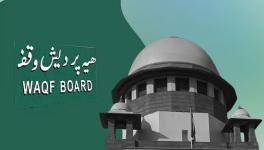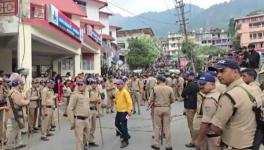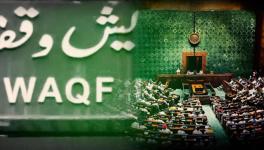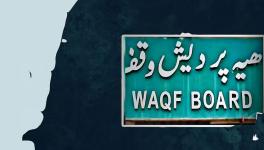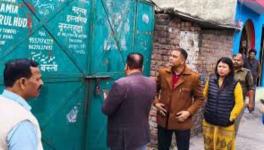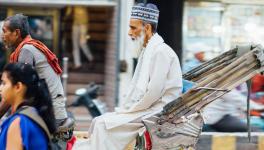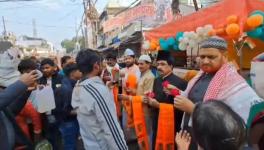Why Can’t Muslim Community Build and Run Modern Schools Like Others: Zameer Uddin Shah
Image Courtesy: Wikipedia
PATNA: A retired Lieutenant General of the Indian Army and former Vice Chancellor of Aligarh Muslim University, Lt Gen (Retd) Zameer Uddin Shah, emits a missionary zeal when he talks about the need for “modern and secular” education for Muslim children, instead of “ghettoised” schools.
“We have to concentrate totally on building a strong educational foundation, particularly school education, nursery onward, based on a modern secular outlook to empower ourselves. There is no other way,” Zameer Uddin Shah, who is the brain behind a successful experiment in the field of education -- Sir Syed National School -- the first such model, modern school, totally funded by the Muslim community in Muzaffarnagar in Uttar Pradesh, said in an interview with Newsclick in Patna recently.
Shah said a similar school would start functioning in Sardana, his home town in Meerut district, followed by another one in Saharanpur district of UP.
The school in Muzaffarnagar was set up three years ago, initially for children of the victims of communal riots, who requested that their children be educated instead of only being providing clothes and food.
”To build this school, a family donated two acres land and AMU students offered Rs 51 lakh by deciding not to have a mega dinner on Sir Syed Day. It is an example of how we can start a school to provide best education”, he said.
Shah said the aim was to build one modern secular school in every district across India having a sizeable Muslim population. “Why can’t the Muslim community build and run modern schools like others. We have started an experiment, and it has been drawing attention and inspiring many”.
The former AMU Vice Chancellor said “we (community) need a movement for education, as modern secular school education for the community is a must for its development. Without quality modern education, empowering young Muslims is not possible. But the faults for this pathetic situation of the community today are our own. We have neglected the importance of education, particularly modern education”.
Shah said the community itself had to come forward to make new strategies to educate and develop skills for empowering young. They should build schools “with a modern outlook, with Islamic ethos on the lines of Christian missionaries-run institutions,” he added.
Expressing his helplessness over poor education of young Muslims, Shah said, “We have Muslim youths who cannot qualify or crack competitive exams for jobs as well as in top educational institutions due to weak education system. They need good school education as foundation should be strong to face the world,” adding that “people don’t realise that schooling is most important. Without schooling, there is no headway or progress.
Seeing a ray of hope in the school being run in Muzaffarnagar, Shah said he was surprised that 40 Muslim families had come forward to offer two acres for setting such schools in different parts of Uttar Pradesh. “The government funds and help may come, but Muslims have to set up world class schools for children. Other communities have done it”, he added.
Shah recalled that he started his education from a madrasa but today there is an urgent need of modernisation and reforms to give a new look to madrasas. He said his attempt at modernisation at Nadwa did not succeed, adding that imparting Islamic and Qur’an education is proper but madrasa students also need livelihood, like others.
He pointed out that the condition of the Muslim community today was exactly what it was in 1857. “The community is victimised, marginalised, impoverished and at the bottom of development indicators. The British took special measures against Muslims then. All that is happening now is a repeat of 1857. The present ruling dispensation is responsible for it,” he said, adding that Muslims had become “objects of scrutiny, unfair measures have been taken against them in the country despite the fact that the community is totally powerless”.
Shah, who is author of a book, Sarkari Musalman, suggested that the Muslim community should forget about politics for the time being and focus on educating their children to get into the decision-making process.
He refuted the old theory of discrimination against the community. “It is a weak education system because of which Muslim youths hardly qualify or crack competitive exams and tests for admission in top educational institutions,” he said, while admitting that there was partial discrimination against Muslims and Dalits, as they lagged in modern education.
Shah was also critical that unlike Christians and Sikhs, Parsis and Jains, the Muslim community hardly made any serious effort to construct and build modern educational institutions, including schools. He cited the example of the Bohra Muslim community, who are building educational institutions without looking for help from others or government.
Shah also said the government should take care of all its citizens for the cause of nation-building. “If a portion of your body, for example, the right arm does not function, then the body is useless. If 14-15% of Indian Muslims are rendered worthless and useless and discriminated against, the nation itself will suffer. It is entirely the responsibility of the nation to carry forward the minority. India cannot progress without Muslim community putting its hard work jointly with majority community together.”
Muslims, the largest minority community in India, remain marginalised and backward, even 70 years after the country’s independence. In the last one and half decades, two official reports -- Justice Ranganath Mishra’s report by the National Commission for Religious and Linguistic Minorities, and another by Justice Rajinder Sachar on social economic and educational status of the Muslim community of India – depicted the poor education and socio-economic condition of the community and suggested for measures for their empowerment. But over a decade after these reports were submitted to the government, the community continues to face challenges in the field of education and empowerment.
Get the latest reports & analysis with people's perspective on Protests, movements & deep analytical videos, discussions of the current affairs in your Telegram app. Subscribe to NewsClick's Telegram channel & get Real-Time updates on stories, as they get published on our website.











